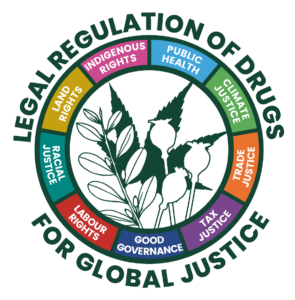
Introduction: The end of prohibition presents an opportunity to think beyond the confines of neoliberal capitalism. Instead of replicating the harms of existing commodity markets, we can seize this opportunity to imagine a new way of trading and reconfigure one of the world’s major illegal trades to prioritise public health, equity, and the planet.

Trade Justice: A regulated drug market must be designed to serve the needs of people; create fair and legal income for small-scale farmers and traders; generate resources for vital public services; and enable fair growth while respecting planetary boundaries. By centering social justice, we can reconfigure one of the world’s major illegal trades to serve people, not profit.

Tax Justice: Global drug sales could provide governments with an additional US$150 billion in tax revenue annually. If designed using principles of transitional justice, drug reforms could generate new, stable forms of revenue for countries to strengthen tax collection capacity, reduce poverty, and improve public health.

Public Health: Despite being framed as a public health strategy, prohibition has failed to protect health. After 60 years of prohibition, more people use illegal drugs and experience greater related harms and deaths than at any other time. Legal regulation offers the opportunity to reduce harm and implement evidence-based public health approaches.

Indigenous Rights: Prohibition has disproportionately harmed Indigenous Peoples across the world. The legal regulation of drugs has the potential to reverse the colonial exploitation of Indigenous plants and knowledge, end the disproportionate incarceration of Indigenous peoples, and enable culturally appropriate healthcare.

Climate Justice: Legal regulation presents a chance to integrate environmental protection provisions into drug markets. Bringing the supply chain out of the shadows can allow for transparency and accountability, removing the power and violence of organized drug crime. However, without engagement from climate advocates, reforms risk perpetuating environmental harms.

Good Governance: The “war on drugs” has fueled organized crime—undermining governance and driving corruption. If constructed using principles of restorative justice, the legal regulation of drugs provides a once-in-a-lifetime opportunity to reduce the power of organized crime and free up power and revenue to strengthen state services and infrastructure.

Land Rights: Prohibition has led to violent land grabs, displacement, and environmental destruction in biodiversity-rich areas. None of these risks are inevitable. Legal regulation must explicitly repeal and repair the harms to land rights under prohibition, including returning land to communities and protecting them from environmental destruction.

Labour Rights: High poverty and informality are common characteristics of rural economies. The shift to legal drug markets has the potential to help people transition out of the illicit economy and provide decent and safe work. By ensuring labour rights, drug reform can reduce unemployment, improve working conditions, and begin addressing economic inequality.

Racial Justice: It is no secret that the “war on drugs” has been a war on race from its inception. With change comes opportunity, and a legally regulated drugs trade can have racial justice embedded in its framework from production to consumption. With thoughtful deliberation, the list of how drug reform can enact racial justice can be just as extensive as that of how drug prohibition has enabled racial prejudice.

